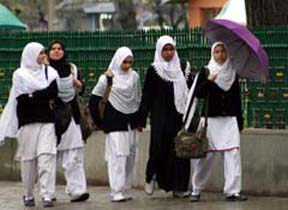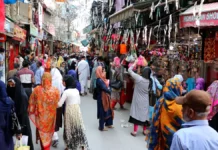 NEW DELHI: For most Muslim girls belonging to economically weak families in south east Delhi’s Jaitpur Extension, a high school education is a privilege they cannot avail for reasons both financial and religious.
NEW DELHI: For most Muslim girls belonging to economically weak families in south east Delhi’s Jaitpur Extension, a high school education is a privilege they cannot avail for reasons both financial and religious.
Jaitpur Extension, a resettlement colony near Okhla, houses poor and middle class families whose breadwinners are mostly daily wage workers. Consequently, almost every household in the area has girls who have dropped out of school.
However, bucking the trend is a woman – Farida Khan – who runs classes free of cost for such students, some of whom recently took their matriculation and intermediate exams as private candidates from Jamia Milia Islamia University and passed, against all odds.
“These girls wanted to study but could not. The entire area had some sort of negativity. I had been through that stage in my life earlier and thus I decided to change that,” says Farida, the Director of ‘Pehchan’ Coaching Centre where she trains her students.
Pehchan, is a non-government organization that was registered in 2015.
“The most difficult part was convincing their parents that it is both safe and useful to teach the girls. Many were skeptic initially but as the students fared well in exams, it changed their parents’ outlook,” she says.
Among her students is the 24-year old Mubeena who recently passed her intermediate exam.
“My father passed away almost 10 years ago. We were facing financial problems and the relatives were forcing me to get married. Everything was mixed up. For a few years, I was imprisoned inside my own house,” says Mubeena.
However, things have now changed for Mubeena who also has a respectable job that pays her enough to supplement her family’s income. However, for her, education is much more than that job she has landed.
“Education has made me see things differently. Earlier I thought girls were supposed to stay inside the house, get married and serve their husbands. But now I have realized how important it is for girls to be educated,” she says.
Apart from pursuing her own studies further, Mubeena wants to work for girls like her who want to study but do not get opportunities.
For a better future
Then there is Ruheen, 20, who is now studying a fashion designing course
“I had to face a lot of struggles to reach where I am today. I wasn’t allowed to even go to my house’s terrace. When I joined the class, I had to wear a burqa. But I had decided to make those compromises. I had decided to leave my past for a better future,” she says.
“The attitude of family has changed. They are supporting my studies now. They were very happy over my 12th results and when I got admission in college. I want to be a fashion designer as much for them as for me,” she says.
Apart from the two, there are 28 more such girls who took the exam this time. Each one of them has faced struggles of their own and has stories to tell and dreams to share.
Farida says women’s education is often clamped down under the garb of religion.
“Islam tells us to study but in practice women are not allowed to study. People fear that if women study they will know and demand their rights. They don’t want that. They want to maintain the status quo,” says Farida.
“However, there are families who educate their girls and support them. Those girls are lucky,” she adds.
Farida says there is still a long challenging road ahead of her, especially in an area like Jaitpur which has no government school within a 7 km radius.
The Chairperson of the organization Iqbal says the situation is more complex than just pointing finger at parents for not allowing their children to study.
“In a place where people are sure neither of their jobs nor their dinner, education becomes a secondary option,” says Iqbal.
“Yes you do have Right to Education but it is to make sure that students aren’t refused admissions in schools. But what do you do about those who do not want to study at all or their parents don’t allow,” he says.
Farida’s and Iqbal’s concerns are real but there is a sense of reassurance with which Mubeena says, “Educating a woman profits not just her, but her entire family, in every sense.”
Uttered by a girl who at the age of 20 was brought to Farida by her mother to learn tailoring so that she could earn a few extra bucks, it is clear that both Farida and Mubeena have come a long way, with a longer road to cover.-PTI
Chiranjibi Thapa






